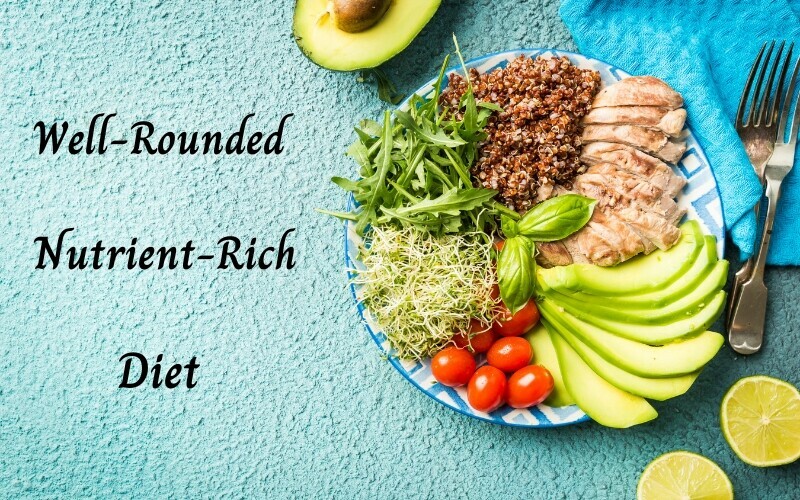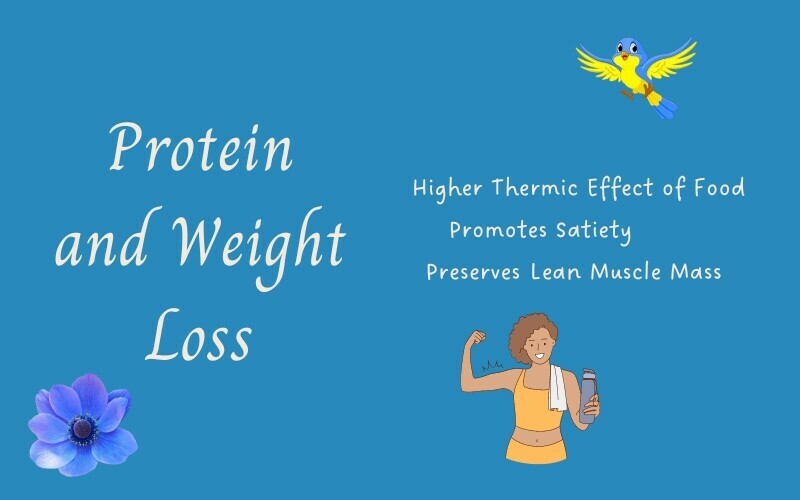Have you ever wondered, does protein help lose weight?” This question can arise when you are trying to lose some excess pounds. You want your efforts to be both effective and sustainable.
Understanding the role of protein in weight management is crucial for creating a successful diet plan. By exploring how protein affects metabolism, appetite control, and muscle preservation, we can better grasp its impact on shedding pounds.
In this article, we’ll delve into the science behind protein’s role in weight loss, aiming to provide clear insights and practical tips for those striving to achieve sustainable results.
Macronutrients and Their Unique Roles
To begin with, lets look at macronutrients and their unique roles in your body.
Protein, along with fats, and carbohydrates, form the trio of macronutrients that are essential for our body to function at its best. While all three are important, today we’re looking at protein – and its importance in weight loss.
The Importance of Protein in Weight Loss
You might be curious about how protein affects your hunger and fullness cues. This isn’t just about keeping your stomach from growling; it’s also about complex response of hormones. Proteins help regulate key hormones like ghrelin and leptin. These hormones send signals to your brain of either hunger or satiety.
When you consume protein, you tend to feel fuller for longer. This can help curb your urge to snack, and potentially lead you to reduce your overall calorie intake. So if you are hungry, you may want to eat a hard-boiled egg.
1. Metabolic Boost – How Does It Work?
Protein doesn’t just provide calories; it also expends energy during digestion and absorption. This is known as the thermic effect of food (TEF). Proteins have a higher TEF (20-30%) compared to fats and carbohydrates, contributing to a metabolic boost (American Council on Exercise).
Simply by eating protein, it causes your body to use more energy (calories) in digestion compared to fats or carbohydrates.
Don’t just take my word for it. Plenty of studies, like those published in the American Journal of Clinical Nutrition, attest to the positive link between a high-protein diet and weight management. The outcome is better weight control and reduced hunger levels than if you ate less protein.
2. Appetite Regulation
Ever wondered why a protein-rich meal leaves you feeling satisfied for longer? Research, as highlighted in the International Journal of Obesity, indicates that higher protein diets lead to increased feelings of fullness. This, in turn, can curb the temptation to overeat.
It is not just about a high-protein diet versus a low-carb or fad diet. It is about finding balance. High protein is useful, however, too much may give you heart-burn; so moderation is still the key.
However, in my opinion, eating a bit more protein might give you an edge. The power of protein helps cut down on cravings, which can help you reduce your overall caloric intake.
3. Preservation of Lean Muscle Mass
Also, losing weight isn’t just about shedding pounds; it’s about losing fat yet preserving lean muscle mass. Protein plays a crucial role in this preservation. It supports muscle building and prevents muscle loss during weight loss (Journal of the American College of Nutrition).
Protein’s Effect on Energy Balance
1. Caloric Density
When it comes to weight loss, not all calories are created equal.
Protein-rich foods, like chicken breast and tofu, offer fewer calories per gram compared to fatty foods. This lower caloric density makes them a favorable choice for those aiming to reduce overall calorie intake (USDA FoodData Central).
2. Impact on Total Caloric Intake
Increasing protein intake can contribute to reduced overall food consumption. The Harvard T.H. Chan School of Public Health suggests that a higher protein intake can promote a feeling of fullness, leading individuals to consume fewer calories overall. This, in turn, supports the creation of a calorie deficit crucial for weight loss.
Protein Sources for Weight Loss
1. Lean Proteins
Incorporating lean proteins into your diet, such as poultry, fish, and lean meats, is beneficial for weight loss. These sources, recommended by the Mayo Clinic for their lower fat content, contribute to a nutritious and weight-conscious meal plan.
2. Protein Supplements
For those struggling to meet protein goals through food alone, supplements like whey protein, casein, and plant-based powders can be valuable additions. The Journal of the International Society of Sports Nutrition acknowledges the role of these supplements in enhancing protein intake, especially for individuals with specific dietary preferences or restrictions.
Considerations and Caveats
1. Individual Variability
It’s crucial to recognize that there’s no one-size-fits-all approach to protein intake. Factors such as age, gender, and activity level influence individual protein requirements. The National Academy of Sciences provides personalized guidelines to help determine the right protein intake for different populations.
2. Balanced Diet
While protein is undoubtedly important, achieving sustainable weight loss requires a balanced diet. The World Health Organization emphasizes the significance of a well-rounded, nutrient-rich diet that includes adequate amounts of all essential nutrients for overall health.

Incorporating Protein into a Weight Loss Plan – How Protein Accelerates Weight Loss
Don’t worry too much about getting pigeonholed into eating the same meals every day. Different protein sources cater to a variety of diets. You have choices that range from plant-based, to pescatarian (fish), to omnivorous (both plants and animal products).
Let’s look at choosing the right types of protein and how to integrate them into your eating habits.
Stay with me as we move into practical advice for applying these weight loss principles into your daily life.
1. Setting Protein Goals
Understanding your daily protein requirements is fundamental. The Centers for Disease Control and Prevention (CDC) recommends a general protein intake of 46-56 grams per day for adults. However, individual needs may vary. Consulting with healthcare professionals or registered dietitians can help establish personalized protein goals.
2. Meal Planning
Building meals with a focus on protein, vegetables, fruits, and whole grains is a practical approach. The USDA’s MyPlate provides guidance on creating a balanced plate, ensuring you meet your nutritional needs while working towards your weight loss goals.
How Does Protein Help Lose Weight?
In summary, scientific research suggests that protein plays a crucial role in supporting weight loss efforts.
Here’s how:
1. Higher Thermic Effect of Food (TEF): Protein-rich foods require more energy to digest and metabolize, potentially boosting metabolism.
2. Promotes Satiety: Protein promotes feelings of fullness and satiety, reducing overall calorie intake and potentially curbing cravings.
3. Preserves Lean Muscle Mass: Essential for maintaining muscle mass during weight loss, ensuring that the majority of lost weight comes from fat rather than muscle tissue.
Incorporating adequate protein into one’s diet can be an effective strategy for achieving and maintaining weight loss goals.
In Conclusion
The question Does Protein Help Lose Weight? is met with a resounding “Yes!” and it is backed by scientific evidence.
Protein plays a pivotal role in boosting metabolism, regulating appetite, and preserving lean muscle mass, making it indispensable in your successful weight loss endeavors.
Through the benefits of protein, you can confidently embark on a journey towards healthier living. Incorporate lean proteins into a well-balanced meal meal plan can significantly enhance your weight loss efforts.
With dedication, informed choices, and a balanced approach, achieving weight loss goals becomes not just attainable, but sustainable.
Consider your individual needs and maintain a balanced diet.
Consulting with healthcare professionals or nutrition experts can provide personalized guidance for optimal and sustainable results.
Disclaimer: If you have any concerns or questions about your health, you should always consult with a physician or other healthcare professional. No content on this site should be substituted for direct medical advice from your doctor or other qualified healthcare practitioner. The information contained here is for informational purposes only. It is from my research and personal experience.
Related Posts
How to Change Your Mindset and Lose Weight
16 Secret Habits of People who Lose Weight and Keep It Off
How Can You Prevent Muscle Loss as You Age?
Is Working Out 30 Minutes a Day Enough to Lose Weight?


I’ve always thought that adding more protein to my diet would just increase my weight, but after reading this, I have a new insight into how it really works for weight loss. I’m curious about one thing: how does the source of protein (plant vs. animal) influence its benefits for losing weight and muscle gain? Would appreciate any scientific study or proof you could include in this post! Thanks in advance.
Hi Corey, thanks for stopping by.
Losing weight can be complex. We do know that to lose weight, you must consume less calories than your body burns, that is to be at a caloric deficit. We also know that it takes more calories to digest protein than it does carbs and fats. That is because of the thermic effect of food.
Also fiber is another important factor, and only plant-based foods contain fiber. Protein helps you stay full for a longer period of time. Personally I think a balance between lean animal proteins (poultry and fish) and vegetable proteins is a healthy option. It is necessary to have a balanced diet to get the nutrients from a wide variety of colorful foods.